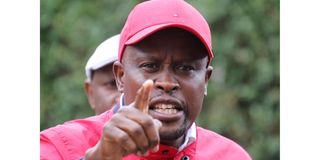IEBC denies rigging claims in Kieni parliamentary seat petition

Ex-Kieni MP Kanini Kega during a press conference in Nyeri town on July 9, 2022. He has challenged his defeat in the August 9 polls.
The electoral agency has denied allegations that it committed election fraud in Kieni constituency, Nyeri County, urging the High court to dismiss a petition challenging the voting results.
Responding to a suit filed by a voter and a political agent allied to former MP Kanini Kega, the Independent Electoral and Boundaries Commission (IEBC) says it conducted free and fair elections.
In the matter before Nairobi Judge Dora Chepkwony, Mr Kega’s chief agent, James Maina, and voter Geoffrey Wahome want the results nullified.
Mr Anthony Wainaina won the race with 45,371 votes followed by Mr Kega, who garnered 25,002.
Through lawyer Musa Boaz, they accuse the IEBC and Kieni returning officer David Mbui, who are listed as the first and second respondents, of vote padding, ejecting Jubilee party agents from polling stations, allowing errors in the results and irregularly assisting voting.
MP Wainaina, the third respondent in the suit, is accused of voter bribery and sabotaging Mr Kega’s campaigns
But in an affidavit, Mr Mbui rejects the claims of vote stuffing and manipulation, arguing that no such incidents were reported to the IEBC or law enforcement.
The petitioners cite alleged discrepancies in the number of registered voters who cast ballots for President and member of the National Assembly at six polling stations, blaming this on ballot stuffing in the race for MP.
This, they say, resulted in a mismatch between the total number of votes cast for MP and those for President.
The petitioners’ court papers show the total number of votes cast for MP as captured in form 35A was 75,842, while those for President were 73,462, a difference of 2,380 that could not be accounted for.
But in his defence, Mr Mbui says the difference is accounted for by rejected, spoilt and stray ballots.
He also denies allegations that Mr Kega’s political agents were denied entry to over 20 polling stations, arguing that if such incidents occurred, the chief agent would have raised a complaint with the IEBC, but this did not happen.
“A further perusal of forms 35A reveals that agents belonging to the Jubilee party, which Mr Kega is affiliated to, signed almost all forms, thus reinforcing the position that the allegations are false,” Mr Mbui says.
He denies accusations that he allowed mistakes in the results that saw repeated cancellations on forms 35A allegedly made without respective counter-signing by IEBC officials.
Human error
The alterations, he argues, were minor and were made to correct mistakes caused by human error by presiding officers, adding that the corrections were made openly and countersigned by political party agents.
But he admits a typographical error on form 34B from the Kimahuri Youth Polytechnic station one that shows total valid votes as 24 instead of 364, although he notes that the error did not go into the final results.
The IEBC wants the court to dismiss claims that the elections were marred by irregular assisted voting, saying that the allegation lacks a factual basis.
He rejects accusations that some presiding officers were involved in voter bribery or giving out extra ballot papers to voters with the intention of inflating voter turnout, saying they are unfounded as no report was made to the relevant authorities.
Mr Mbui says the parliamentary elections recorded only one malpractice that involved an IEBC clerk issuing extra ballot papers to a voter at the Kihuhiro Primary School polling station and the two were charged in court.
“The incident was an isolated one and it is dishonest for the petitioners to extrapolate the issue,” he argues in court documents.
He also denies using electoral demonstration materials made for voter education and identifying Mr Wainaina, saying the evidence presented in court is stage-managed while requesting the court to dismiss the suit.
For his part, Mr Wainaina says the petitioners are not entitled to the orders sought on access to Kiems kits and the voters’ register and a recount of all votes cast on the grounds that the accusations against him lack a factual basis.
Through lawyer Muhoho Gichimu, he denies inducing voters with monetary benefits, promising parcels of land in exchange for votes and using violence to prevent other candidates from freely campaigning.
He rejects as false the claim that he sent messages to voters through social media during campaigns so as to damage Mr Kega’s reputation.
“The respondent has no knowledge of the Facebook account that allegedly sent a message destroying Mr Kega’s image,” lawyer Muhoho says in court documents.
The case continues on October 17 and 18.




